Since lockdown was relaxed, it seems hardly a day has gone past when there has not been some national media coverage claiming that visitors have been responsible for a wave of litter that is said to engulfing the countryside. In the vast majority of cases visitors have been condemned, abused even, sometimes by people purporting to speak on behalf of rural communities. The problems are often attributed to campervanners and “wild camping”. There is an increasing volume of calls for both activities to be controlled, with serious implications for access rights, civil liberties and people’s ability to enjoy the countryside.
There are more thoughtful contributions (see here for example), but as a leader in the Guardian yesterday acknowledged (see here), they are few and far between. The coverage and the debate is not balanced. So what is going on and what explains this?
The problem
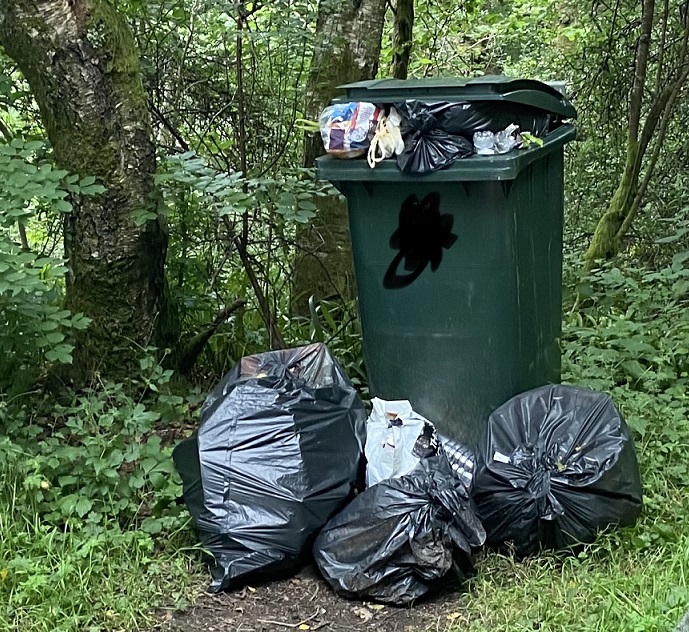
Perth and Kinross is arguably one of the better councils when it comes to litter provision in the countryside. It provides bins in laybys and other popular stopping off places. This provision has been overwhelmed by the number of people visiting the countryside as a result of Covid-19.
The simple and obvious answer is Councils need to increase the number of bin collections. This was made very difficult by austerity but the UK Government is now using its money creating powers to pay for people to be furloughed when we could have been paying them to do real jobs. That, however, would mean increasing public services and would challenge the neo-liberal orthodoxy that everything should be up to the individual and with that the public sector is bad. From the neo-liberal perspective, which dominates government in Scotland and the UK, it is better to do nothing and blame the public for the problems that ensue rather than increase the size of the state.
There are of course people who don’t even attempt to leave litter in bins or by them when they are full. The reader who sent me the photo above told me they had picked up and bagged a number of cans that had been left scattered around the area. The evidence, however, is overwhelmingly that where bins are available they get used and therefore they have a massive part to play in reducing the amount of litter (whether in the countryside or the town).
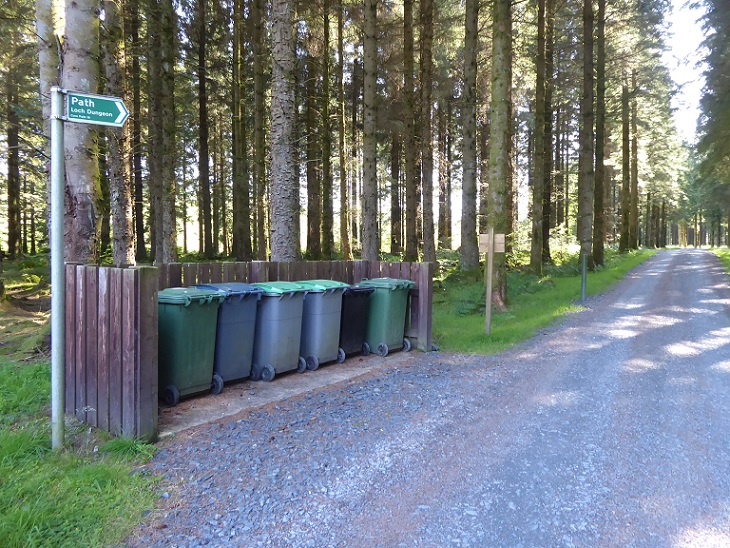
Just over a week ago I visited the Forest Estate to do a walk around Corserine and Meikle Millyea in Dumfries and Galloway. While far less crowded than some other parts of Scotland, it was spotless. It was the same again in Moffatdale this last weekend. It simply isn’t true that the whole of Scotland is sinking under a sea of litter. Some places are, some aren’t.
In terms of litter disposal points, it is not just about the availability of bins and their capacity. The Forest Estate had taken the trouble to screen the bins and keep the area immediately around them spotless. That gives the strong impression they really do care about how the area looks and encourages, I believe, visitors to care. The bins provided by Perth and Kinross and Highland Council bins in their laybys are located by the side of the road with little or no attempt at landscaping. They get used, but I suspect the way the bins are presented means some people take a little less care.
Driving back down the public road from Forest Lodge someone had left a large green bin by the side of the road with “Toss your litter here” painted on the side. I passed it before thinking to take a photo but thought it a nice touch. There were no signs of litter along that minor road that bedevil much of the Loch Lomond and Trossachs National Park.
By contrast in large parts of the Loch Lomond and Trossachs National Park there is little or no provision for litter disposal at popular stopping off places. It should surprise no-one there is a significant litter problem as a consequence. Much of this lack of provision pre-dates the imposition of austerity, which has affected the local councils who have primary responsibility for litter collection more than almost any other public authority. Since it was created in 2002, the LLTNPA has promoted the National Park Authority as a great place to visit – and so it is – without making any concomitant improvements in visitor infrastructure. The chickens, as it were, are now coming home to roost……………..
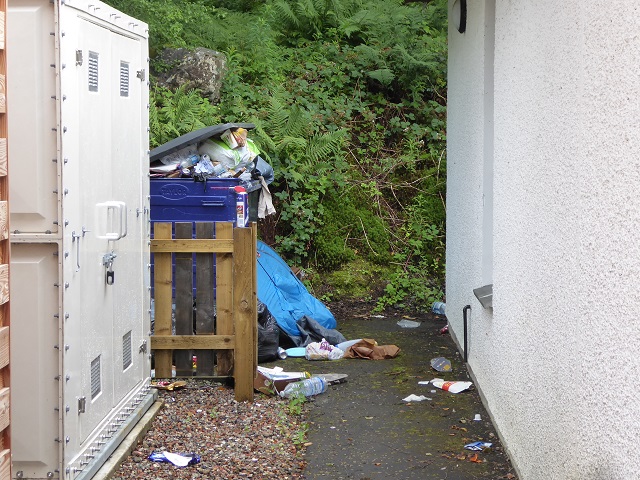
Unfortunately, the LLTNPA sometimes gives the impression it simply doesn’t care (see here for other examples). If the National Park Authority doesn’t, why should anyone else? While austerity has been a challenge, the LLTNPA has seen less of a cut to its budget than local councils.
The LLTNPA’s response to the lack of adequate litter disposal facilities
For over ten years now, rather than making the case for publicly funded litter disposal facilities, the LLTNPA has been urging people to take their litter home. It hasn’t worked. At the end of July the National Park Authority launched a new campaign “Love it Like a Local” (see here) based on the same theme:
“It’s a really simple ask: either bin your litter, or if there isn’t one or it’s full, bag up your litter and take it home”.
There is no reason why this simple solution will be any more effective than it has been in the past.
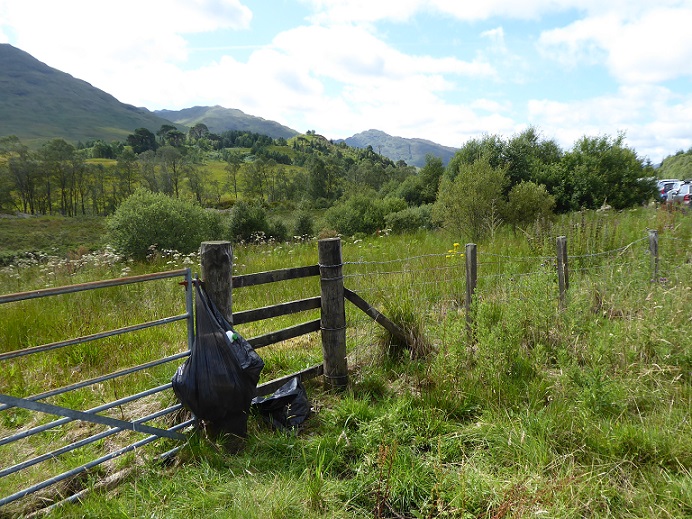
According to LLTNPA logic, whoever left this bag hanging on the gate was acting irresponsibly. Actually, it may be one reason why this layby was far freer of litter than most:
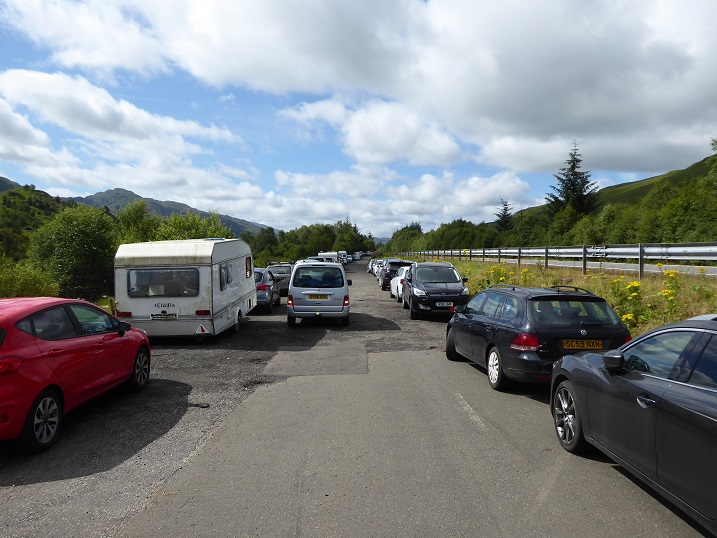 I had never seen the layby as full. The caravan, which has been there for some time, appears to have been abandoned. It and part of a broken glass windscreen which someone might have cleared up if there had been anywhere to put the glass, formed the main blight in the layby. Asking people to take their litter home won’t address these issues.
I had never seen the layby as full. The caravan, which has been there for some time, appears to have been abandoned. It and part of a broken glass windscreen which someone might have cleared up if there had been anywhere to put the glass, formed the main blight in the layby. Asking people to take their litter home won’t address these issues.
The Love it like a local campaign, purports to present the view of local people (see here for video of local speaking). This serves to conceal the fact that BOTH locals and visitors face the same problem, it’s increasingly hard to dispose of litter anywhere due to cuts in provision.
A hundred metres from this bag, hidden from the layby and the path, I found this:
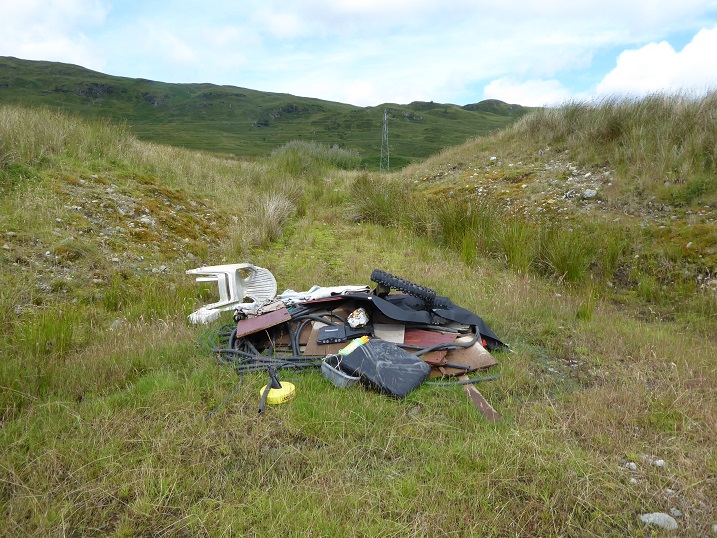
My suspicion is this was dumped by a local, who else would travel so far? Just opposite was this, which appears to have been left by the estate:

If you care to look, almost anywhere you visit in the countryside you will find examples of local fly-tipping:

This should not surprise anyone, whether you are a local or a visitor. The issues are the same, the facilities for disposal of litter in the countryside are totally inadequate. The common interest that visitors and locals should have in improving local facilities is constantly obscured by the LLTNPA’s messaging which ignores the real problems. Government seems to love simple messaging instead of well thought out plans to address complex issues.
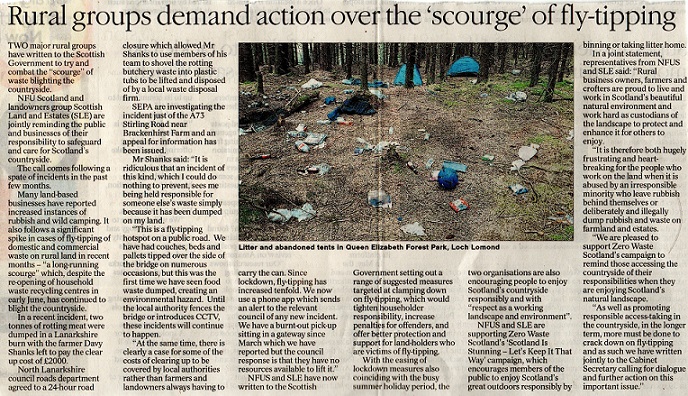
I The media unfortunately make this worse. The Scottish Landowners Federation and National Farmers Union, with whom I often disagree, here rightly pointed to how the problems of fly tipping in the countryside have become far worse as a result of lockdown. Yet the article is illustrated by a photo of litter around tents. That helps feed the myth that the main litter issue that needs to be addressed is “dirty camping”. The article refers to “increased instances of rubbish and wild camping” as if wild camping is itself a problem.
This poor coverage is not all the fault of journalists. The LLTNPA, in order to win consent for its camping byelaws, marketed the idea that camping was the cause of all litter and still repeats that in order to try and justify the continued existence of the byelaws (see below). Actually, what this proves is that the camping byelaws – trying to control where people camp – have made very little difference.
The LLTNPA appear completely closed to the possibility that provision of litter disposal facilties for locals and visitors alike might be more effective and cheaper than having to continue to police the camping byelaws.
Zero Waste Scotland enters the fray………….
On 15th July Zero Waste Scotland launched a campaign against the litter “menace” that is remarkably similar to that of the LLTNPA (see here).
Now, I believe that Zero Waste Scotland has an important role in reducing litter. If there was not so much packaging and so many disposable items like coffee cups, there would be far less litter, both in towns and the countryside. Moreover, if all that packaging was biodegradable, that would significantly reduce the problem and the impact that longlasting litter like plastic has on wildlife. However, instead of putting their efforts into addressing the root of the problem and making the case that all businesses that sell take-away food and drink, for example, should only use bio-degrable and recyclable materials and should be required to provide properly recycling facilities, ZWS are calling for the public to take their litter home if there is no bin.
Recently, their Director, Ian Gulland had a piece in the Herald (see here) which revealed that ZWS had “partnered” with the Scottish Government and Keep Scotland Beautiful in the campaign. A Scottish Government backed initiative then. A couple of things he said, and the way he said them, struck me:
- “Throughout lockdown we saw a rise in flytipping , coinciding with reduced waste collection and the closure of recycling facilities”. That is not true, the rise in flytipping did not coincide with reduced waste collection, it was caused by it (as was graphically described in the Herald article above).
- Second was the statement that “an estimated £53m of public money is spent on tackling litter and fly tipping each year” as if this is an enormous sum. Scotland has a population of 5.4 million so we spend just under £10 a head. I estimate I personally spend about 10 hours a year picking up litter, other committed volunteers do a lot more (see here). Increasingly, it appears the state is shifting responsibility for collecting litter onto volunteers.
But it was Mr Gulland’s main message, that litter is an individual responsibility, that struck me most. It was was based on a mixture of threat (its a crime) and exhortation (save Scotland’s beautiful countryside for wildlife, tourism etc). My response is it’s all very well for Mr Gulland to call on people to take their litter home but my glass recycling bin in Glasgow hasn’t been emptied since early March and the Council has now said it won’t be until September. Six months! Mr Gulland failed to explain the truth which is that due to increasing cuts to Councils many waste disposal services are in a state of collapse. Shunting responsibility, by asking individuals to move their rubbish between areas, is not going to change that.
Why the message “bin it or take it home” won’t work
Many people don’t need to be told to put their rubbish in a bin or take it home as they are disposed to do this and have learned to take little packaging with me into the countryside. But where I like to have a bin is where I have picked up other people’s rubbish. Taking other people’s clean rubbish home is fine – though I am not going to pick up bottles when my bins aren’t emptied – but I really don’t feel much inclined to put one of those dog poo bags you find hanging from trees in the back of my car, let alone take it home on the train. The people who leave that stuff don’t either, which is why you find it hanging on trees. A strong argument for why we need proper litter disposal facilities.
Our preparedness to carry litter home varies as individuals and as organisations. Outdoor recreationists tend to be quite used to having things like muddy boots in the back of their car or humping rucksacks. Generally, therefore such people are unlikely to have many qualms about taking dirty litter home. Other people aren’t used to carrying stuff, or having a spotless car forms part of their identity. They may take the consumables that turn into “dirty” litter out to the countryside, but they are extremely unlikely to take items like used barbecue trays back. That is the reality. What they might understand is “leave the countryside as clean as the back of your car, put your litter in a bin”. But for that to happen, there need to be bins in place.
My friend Nick Halls has a bag and a pair of gloves in the back of his van which he uses to put items other people wouldn’t touch. Four years ago, after we had packed up an abandoned tent on the shores of Loch Achray, we asked LLTNPA Rangers to take it as there was no litter bin at the nearby car park.(see here) . They refused to do so for health and safety reasons!
The law is a complicated matter. Potentially by putting an apparently abandoned items into the back of your vehicle, you could be accused of theft.
We need to provide proper rubbish disposal facilities and let people with the right equipment dispose of it. But this is all off limits because no-one in government wants to admit that we need to spend more to save the countryside from this “litter menace”. A small tourist tax, such as they have all over the continent, could pay for proper waste disposal facilities for visitors in an instant. It could address much of the problem, but that takes us back to neo-liberal ideology to which the very idea of tax is anathema.
Abuse doesn’t work – but it has serious implications for our rights and freedoms
The release of lockdown and the large numbers of people visiting the countryside – a very good thing – has forced the LLTNPA to act:
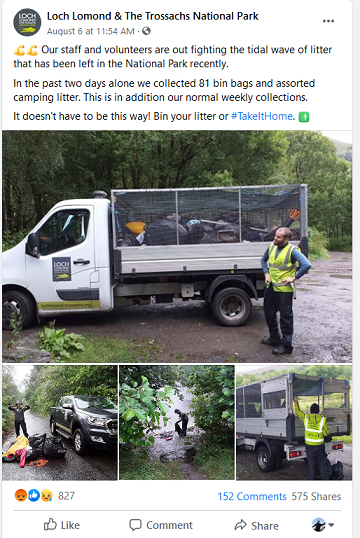
The van provides proof on the ground that their message isn’t working while the reference to “assorted camping litter” provides more proofthat the camping byelaws, which were promised to solve the issues associated with dirty camping, aren’t working either.
The problem for access rights is that rather than changing the message and coming up with a plan that addresses the issues, the LLTNPA keeps repeating the message and in a manner that appears designed to inflame. “The tidal wave of litter”. It is worth reading the multiple comments below the post (see here) which start:
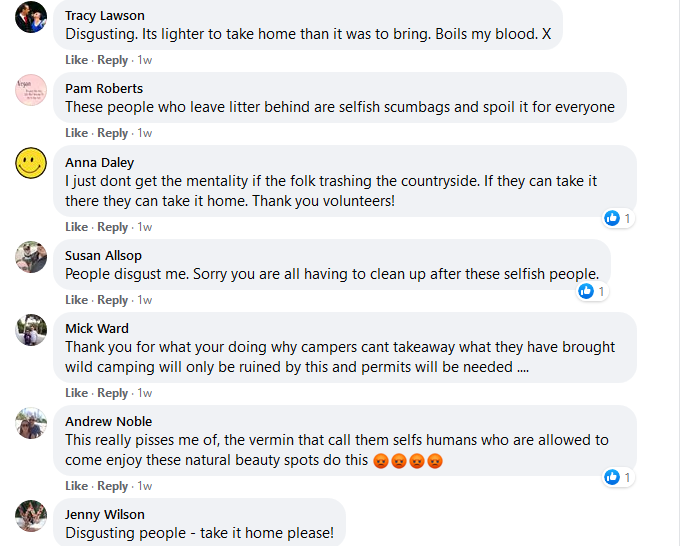
………….the next comment is “sieze and crush their vehicles”!
While abuse may make some people feel better, it is unlikely to encourage the intended targets of the messaging to listen (why listen to anyone who calls you selfish, disgusting, scumbag or vermin?). Abuse does nothing to address the issues. There are only a couple of comments about the lack of facilities in the National Park. Brave people!
To address the issues we need to understand why people litter or fly-tip but it appears no-one in government is interested in asking because all the likely answers are likely to require government intervention and resources. These range from drastically reducing the amount of disposable stuff in our economy to spending more on policing in the countryside to deal with the minority of people who won’t be influenced however good the infrastructure. Rather than tax and spend it is much more desirable, from a neo-liberal perspective, to blame people for what is going wrong and it is becoming increasingly authoritarian as a result.
On litter, the consequence is a vicious circle which has serious implications for access and other rights. Government tells people they should do something, the people who don’t are subject to all sorts of abuse, that abuse then persuades politicians that they need to take action…………….it’s a small step from abuse of litterers to measures like the LLTNPA’s byelaws designed to ban “wild camping” and campervanning. We have seen plently such calls in the last few weeks. Perfect storms should not be ignored.
In this case the negative narrative is being fed by concerns from some people living in rural areas about catching Covid-19 – who see litter as another justification for keeping people out of the countryside – and by some business interests who would like to force everyone to stay in campsites or building based accommodation. That is why, for example, the camping byelaws were extended from the head of Loch Lomond up to the Falls of Falloch after consultation.
Our National Parks should have been providing a model to government and the population as a whole of how to address litter issues in the countryside and provided a means of avoiding this toxic and generally one-sided “debate”. Instead, the LLTNPA bears a large degree of responsibility for the negative direction the discourse about litter has taken across Scotland and the messaging that will never work and can only inflame the situation further. What we need is investment. I cannot see that changing until they are forced to throw off the mental shackles of neo-liberalism, accept that proper waste disposal infrastructure needs to be put in place and advocate for the resources necessary.

Totally agree Nick. The government, local authorities and national parks are quite content to blame the public because it costs them nothing. Your suggestions are spot on;
Provide more bins in the countryside and arrange more regular collections
Use existing bye-laws to fine/prosecute the minority of offenders
Well put Nick .Councillors and press have blamed the public for to long now Local authorities have being blamed local flytiping on visitor’s for to long now This is the time now for Scotland’s Government to put good infrastructure into tourism
Hear hear! Sufficient bin provision is part of the services you need to support and encourage responsible use of the countryside. It’s not optional – ditto toilet provision. Two thoughts:
Firstly, the Tory doctrine for public services is “underfund, complain, privatise” – but I’d expect better from a Scottish government – particularly one that openly claims such commitment to the Scottish tourism sector. Supporting the sector means supporting the (public) services essential to it;
And secondly, one of the many benefits brought by the EU was the WEEE (waste and electrical and electronic equipment) directive. WEEE requires manufacturers to appropriately dispose of the equipment they sell. Apply that logic to common rubbish – e.g. take-away food shops required by law to fund waste collection facilities in proportion to the waste they generate by their sales. That would strongly encourage (like WEEE) the creators of future rubbish to find innovative ways to recycle or reuse – and provide funding to Councils to provide an effective service.
The LLTNPA limited camping spaces and bylaws are directly proportional to excess camping in other areas the £175 000 spent on no camping signs would have better been spent on simple waste facilities like bins and collection. the bylaws have clearly failed and recent photos of abandoned campsites mention nothing about the midges easily capable of stripping unsuspecting adults and children to the bone
Is it not significant that practically every failure of public policy with regard to the Rural economy , in general, and the careless performance of Governing bodies for Scotland’s National parks in particular ,is overseen by one almost invisible time-expired Scottish minister. His may be regarded by some as a minor role in the overall Holyrood administration , and yet the portfolio he has been granted ( somehow) contains, agriculture, forestry, rural business and,arguably, the industry with the greatest foreign income earning potential of all – Tourism.
The many oversights for which present incumbent is accountable make it beyond clear that the job is far too big for his level of commitment. He is responsible for official Policy within far too many vital aspects of life . To put it succinctly the task awarded to him – for longstanding party loyalty – is far beyond his grasp. .
Why else was no Central funding provision confirmed and allocated on time to ready the holiday areas for the increase in expected numbers of holidaymakers? When lock-down was eased and urban people might move around more, this was no surprise..the relaxation was proposed weeks in advance….so it should not have been. Tens of thousands were given full encouragement by Scottish Ministers to remain and take their usual holidays – with care -in Scotland. Why was n festival equipment requisitioned and then made available to Local authorities, even community groups, to prepare extra sites . Why was no thought given to waste management provision for this whimsically motivated influx.? Why, when tens of thousands were sitting idle thanks to Furlough on 80% pay, firms with mobile equipment potential were being ignored to go bust. Why were these enterprises never instructed and funded to meet local needs and to get involved?
Among almost all Scottish Ministers one policy is consistent at least – a continual shifting from accepting responsibility to Blaming everyone else. Thanks to torrents of words emanating from Bute House..councillors properly elected to run these essential services regionally, now all blame each other and lack of central “funding” , while huge Quango committees on inflated salaries shrug off all criticism. The public suffer because, perhaps ? press manipulation? incisive investigative stories about failure of leadership or individual accountability, stories of investigations about failures of endless committees ( on full expenses ) never will get written. A centralised administration system could surely work in Scotland, if people of the correct caliber were recruited to run segments within it . Today it does not . Scotland suffers under a micro-manipulated political mess where ‘insiders’ are kept close enough to muffle, while those guilty of failing to act decisively enough in response to every Ministerial challenge, are seen everyday in public dividing up and blaming almost everyone else for their own multiple failures.
Just found this website while trying to find out who is responsible for emptying the bins in lay-bys in Perth and Kinross.Driving south yesterday, every single bin in the lay-bys between Perth and Dunblane was full and overflowing.Why people can’t take their litter home is beyond me but it’s a mess and a blot on the beautiful countryside.Have contacted Perth and Kinross council this morning.I’ll see what they say.